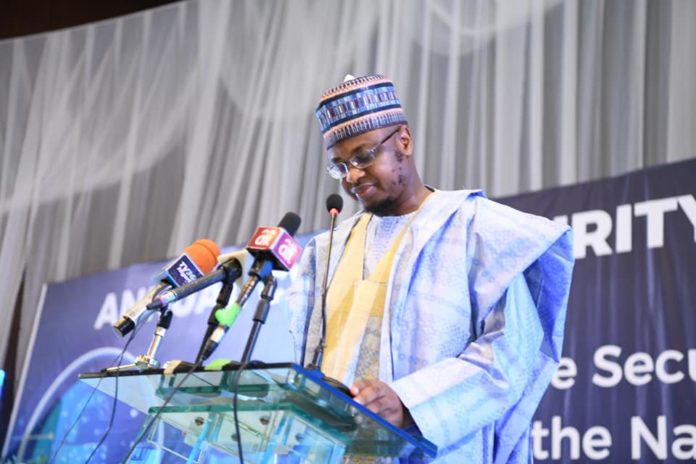PANTAMI: Over 1,667 Centres Is Now Ready To Support Nigeria’s Digital Economy
TECHDIGEST – Dr. Isa Ali Ibrahim Pantami, PhD., the Minister of Communications and Digital Economy on Friday 13th August 2021, in line with the National Digital Economy Policy and Strategy, commissioned seven more projects across the country.
The projects commissioned are in furtherance of the Federal Government’s resolve to leverage on technology in empowering the nation.
This brings the number of projects established under the leadership of Dr Pantami to over one thousand, six hundred and sixty seven (1,667) across all geo-political zones in the country with sixteen (16) policies in place to support the digital economy drives.
Speaking at the hybrid event, the Minister noted that the sector has witnessed unprecedented growth both infrastructurally and policy wise within two years of his assuming office.
“When we came on board in August of 2019, the ministry had only one valid policy which was sponsored by the Korean Integration and Cooperation Agency, KOICA. But within the time we have been in office, we have developed sixteen national policies and established over one thousand six hundred and sixty seven digital economy centres. Of the sixteen policies we have developed, twelve are already being implemented while four are awaiting approval from the Federal Executive Council”, he said.
The projects numbering seven, under batch 11 of completed digital economy infrastructure include;
- Emergency Communication Centre, Lokoja, Kogi State [North Central];
- School Knowledge Centre, Sanda Kyarimi Day Secondary School, Borno State (North East);
- Digital Economy Centre & E- Learning Facilities, Imam Malik Academy, Sokoto State [North West];
- Digital Economy Centre, E- Learning Facilities, Nneato Secondary School, Abia State [South East];
- Digital Economy Centre, E- Learning University of Uyo, Akwa Ibom State [South South];
Digital Economy Centre, E- Learning Eleyele Secondary School, Oyo State [South West]; and
Tertiary Institution Knowledge Centre, Gombe State College of Education, Gombe (North East)
“The Tertiary Institutions Knowledge Centre (TIKC) was deployed by the Universal Service Provision Fund (USPF).
This project includes bandwidth connectivity and the installation of ICT devices and peripherals.
The TIKC project also doubles as an ICT centre for students to acquire and improve their ICT skills. It will promote the use of ICT in teaching and learning at tertiary institutions and their immediate communities”, Pantami explained.
The minister further said enumerated some of the benefits of the project as;
“It will enable lecturers, staff and students to obtain the requisite ICT skills essential for digital economy ecosystem;
“It will bridge the digital information knowledge gap, especially among the teeming youthful population of Nigeria; t will provide personalised learning; enhance research; it will improve student-teacher engagement; and it will provide access to remote learning resources.
Speaking specifically on the ECC project being implemented by the Nigerian Communications Commission (NCC) across the country, the Minister said, the projects are major boosts that will offer universal, toll-free emergency telephone access for members of the public in times of distress/emergency; and a one-stop shop for receiving distress calls from the public and dispatching same to appropriate Response Agencies (Police, FRSC, Fire Service, Ambulance Service, etc).
“Our goal is to have at least one Emergency Communication Centre in each state of the federation including FCT. This will ensure that there is an effective emergency response to cater to the needs of our citizens.
In reference to the four (4) Digital Economy Centres (DEC) and E-Learning Facilities which were deployed by NITDA as part of its mandate to ensure that the Federal Government continues to provide support for institutions to facilitate learning, Pantami, explained that the facilities are solar powered, equipped with computers, Internet access and tools aimed at enhancing skills development, bridging the digital divide and promoting innovative digital solutions that will address challenges facing the country.
“It is well known that the Digital Economy is a core driver of innovation, competitiveness and economic growth. However, no nation can build a digital economy without a constant pool of highly qualified creative talent, as the Digital economy is knowledge-based and is characterized by dependence on a highly-skilled, and technology-inclined citizens.
Therefore, fostering and supporting the capacities of Nigerians is a fundamental backbone of our digital economy strategy. This is why NDEPS has a Pillar dedicated to Digital Literacy and Skills.
Furthermore, Knowledge Institutions play a critical role in the development of the Digital Economy.
They serve as centres for generation and impartation of new knowledge to citizens.
These institutions not only equip individuals with relevant knowledge and skills, but also provide a bustling environment that stimulates innovation thereby enabling them contribute meaningfully in the socio- economic development of their society”, the Minister emphasised.
According to the World Bank, digital technologies are forecast to be a major driver of productivity, with successful economies depending on greater numbers of digitally skilled workers than has previously been the case.
For example, a digital single market in Europe is expected to increase the region’s annual Gross Domestic Product (GDP) by €415 billion and will increase the need for a new set of digital skills by 12% in 2024.
“It is recognition of the need to empower our citizens with the requisite knowledge to thrive in the digital economy that we are deploying projects such as the ones launched today.
Pantami also encouraged all the host communities of these interventions provided by the Federal Government of Nigeria through NITDA and NCC to ensure that they take full advantage of the facilities for the benefit of their communities.
Recall that under the leadership of Dr Isa Ali Ibrahim (Pantami), every state of the federation is a beneficiary of the digital economy projects.
















